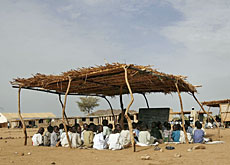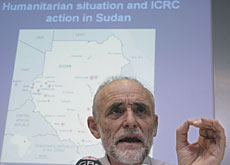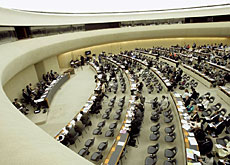Swiss expert says Darfur solution needs time

One year after the Darfur Peace Agreement (DPA) was signed, a Swiss mediator tells swissinfo that there are still many obstacles to peace in the Sudanese region.
Julian Hottinger, a member of the Swiss foreign ministry’s pool of experts who helped hammer out the DPA and its power sharing protocol, has just returned from the area.
A peace deal for the western Darfur region was signed last May by the Sudanese government and one Darfur rebel group, but has failed to end the violence.
The United Nations says around 200,000 people have died since the conflict started in 2003. Fresh peace talks between the government and rebel groups could take place this summer.
swissinfo: Has the Darfur peace accord signed last year been having an effect?
Julian Hottinger: It’s really hard to say. Most effects, if any, would be in Darfur itself and Darfur is not accessible at the moment. There is a lot of talk about the DPA but to what extent we can really talk about any implementation remains unclear.
swissinfo: What are the remaining obstacles to peace?
J.H.: There are plenty. We mustn’t forget that there are ten non-signatory parties, groups that have appeared since the negotiations broke down or one group signed and the others didn’t.
At the same time the war has changed at bit in nature. We have three overlapping conflicts: one that has to do with the rebels in Darfur, a second is a proxy one with Chad and thirdly we have the localised conflicts involving sedentary and nomadic tribes.
swissinfo: There is now the prospect of more talks over Darfur between the rebels and the Sudanese government.
J.H.: The prospect of more talks depends on how they are set up. We mustn’t rush into something and find ourselves facing an obstacle again with a time frame that is unrealistic.
What is needed is to lay out the problems, give the non-signatories time to try to unify themselves and create common positions, and to have a process where there is some recognition that we’ll have to go well beyond the DPA to find peace – that the DPA isn’t enough, and didn’t satisfy all parties.
Because a lot of parties were absent when we negotiated it [the original DPA], there’s the possibility that it will have to be enlarged in such a way that more interest groups can take part.
swissinfo: There is also growing international pressure to find a solution in Darfur, is that also having an effect?
J.H.: It has an effect, no doubt, but it doesn’t always have the effect we hope or wish for. At the same time we mustn’t forget that the international community is quite divided on this issue, especially the United States and China… who are having trouble finding a common line right now because their interests in Sudan are completely different.
swissinfo: What about Switzerland’s role in Sudan?
J.H.: We have a presence in the capital Khartoum and we are quite active in the southern part of Sudan within the [area of the] CPA – the peace agreement signed between the north and south.
We are taking part in the negotiations in southern Sudan involving the LRA, a Ugandan rebel group that has been very active in the south, and we are trying to help, together with other partners in the international community, resolve the problems in Darfur.
We are also running a website in support of the South Sudanese Diaspora in the peace process and in reconciliation and development and we are financing a project aimed at creating a House of Nationalities where representatives of ethnic groups can meet. This is to help preserve the diversity and unity of southern Sudan.
swissinfo: Will there ever be peace in this region?
J.H.: Yes, because you can’t live eternally with conflict and this conflict would destroy Sudan. To a certain extent there is a will to try and find a solution, but it takes time and it’s extremely complicated.
Sudan has been an unstable state since 1956 when it became independent, and even before when it was under British rule. But there is a will to start solving problems and the best proof is the 2005 peace agreement obtained after 21 years of war between the north and the south.
swissinfo-interview: Isobel Leybold-Johnson
Julian Hottinger is an expert in mediation and facilitation attached to the Swiss foreign ministry’s pool of experts.
Until mid-May 2006, he was attached to the African Union Facilitation Team in Abuja, working on the Inter-Sudanese Negotiations on Darfur. His speciality was power sharing.
He has recently been working on negotiations on the LRA Ugandan rebel group active in south Sudan. He has been involved in Sudanese issues for more than four years.
In an Arab-dominated country, Darfur’s population is mostly black African. This had led to tensions.
Experts say the area is also seen as the cradle of Arab Muslim identity in Sudan and that increased desertification had led to people moving into areas they did not formerly occupy.
The conflict began in 2003, after rebel groups accused the Sudanese government of neglect. According to the UN, more than 2 million people have fled their homes and around 200,000 have died.
A peace deal was negotiated in 2006 with little impact. The African Union deployed 7,000 soldiers to try to monitor a ceasefire, but their presence has failed to stop fighting.
Sudan’s government is however under strong international pressure to accept the deployment of a large UN peacekeeping force in Darfur.
Sudan is Africa’s largest nation and one of its most diverse countries. The region of Darfur alone is larger than France.
The 21-year conflict between mainly Muslim north and the Christian and Animist south ended in 2005, with an autonomous government in the south.
An estimated 1.5 million people died in this conflict, in which southern rebels said they were battling oppression and marginalisation.
The Darfur conflict broke out as the north and south were edging towards peace. The southern Sudanese authorities have now invited Darfur rebels and the Sudanese government for talks.

In compliance with the JTI standards
More: SWI swissinfo.ch certified by the Journalism Trust Initiative



You can find an overview of ongoing debates with our journalists here. Please join us!
If you want to start a conversation about a topic raised in this article or want to report factual errors, email us at english@swissinfo.ch.